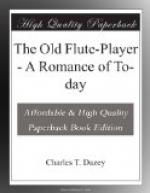“See, M’riar!” he cried.
“Hi sye!” said M’riar, examining it with distant care as if she feared that it would either break or bite. “Won’t she be took haback?”
“And,” said Herr Kreutzer, delving busily in a pocket of his long, limp, overcoat, “a bottle of good wine.”
“My heye!” said M’riar, awed and gaping admiration. “She will be took haback!”
“And, see again?” said Kreutzer, taking other treasures out of packages and pockets, including a roast fowl, and celery and other fixings. “It is not often, lately, that I have my Anna with me. When she comes, then we must do what we can do to make her welcome.” He might have added that it was not often that a little stroke of luck brought him in money for a celebration such as this, but did not.
“Such a feast!” said M’riar.
“Ah, it is something,” said the flute-player. “It is little I can do. I earn so little in this country—less, even, than I earned in London; and here all things cost so much—more, even, than they cost in London.”
M’riar went to the window, after having seen the good things, while his hands went to his pocket and brought from it the door-key and a pocket-knife. He laughed a little bitterly. “The little feast has cost the last cent in my pocket! When night comes I must walk back to the Garden!... Well what matter? Anna is not suffering, and to-day she will be happy here with me.”
“Hi, she’s comin’,” M’riar screamed and dashed out of the room.
Herr Kreutzer gazed after her with a wide smile of toleration. She had not been a nuisance; she had been very useful. “I worried when we found her on the ship,” said he, “and here she is, my housekeeper, while Anna is more happy in the mansion of the Vanderlyns! So things occur as we do not expect.”
There came to him the sound of chattering voices on the stair. He hurried to the door.
“Anna, Anna!” he called into the hallway.
An instant later and she sprang up the last flight and ran into his opened arms. “Father!” she cried happily. There was an unwonted flush upon her cheeks, a new, soft glow within her eyes, a certain subtle dignity about her bearing which he failed to note, but which she knew was there and which the keener eyes of M’riar saw and were much puzzled by.
“Father!” she cried again, and held him in so close a clasp that his face reddened quite as much because she choked him as because his heart was beating high with happiness at sight of her.
“Come, come,” said he, and led her to a chair by the window which commanded a small vista of back-yards—the only glimpse of out-of-doors the tiny tenement apartment offered. “My liebling! My little Anna! It is good to hold you so, again!” He clasped her in his arms.
“’Yn’t it beautiful!” M’riar muttered, gazing at them. “W’ite as snow ’is ’air looks, w’en ’ers that is that dark, is hup hagainst it close, like that!”




